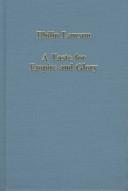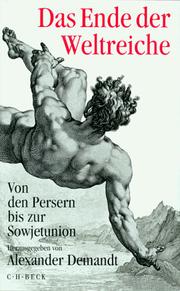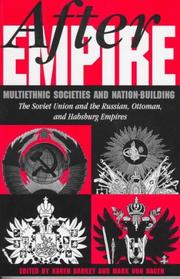| Listing 1 - 6 of 6 |
Sort by
|

ISBN: 0860786366 Year: 1997 Volume: 563 Publisher: Aldershot Variorum
Abstract | Keywords | Export | Availability | Bookmark
 Loading...
Loading...Choose an application
- Reference Manager
- EndNote
- RefWorks (Direct export to RefWorks)
Imperialism --- History --- Great Britain --- Colonies --- Colonialism --- Empires --- Expansion (United States politics) --- Neocolonialism --- Political science --- Anti-imperialist movements --- Caesarism --- Chauvinism and jingoism --- Militarism --- 17th century --- 18th century
Book
ISBN: 2130478522 9782130478522 Year: 1997 Volume: *1 Publisher: Paris : PUF - Presses Universitaires de France,
Abstract | Keywords | Export | Availability | Bookmark
 Loading...
Loading...Choose an application
- Reference Manager
- EndNote
- RefWorks (Direct export to RefWorks)
Comparative government --- Institutions politiques comparées --- Histoire des institutions --- --Empire --- --Système politique --- --Régime politique --- Imperialism --- 3391 --- History --- Europe --- Politics and government --- -Political science --- Administration --- Civil government --- Commonwealth, The --- Government --- Political theory --- Political thought --- Politics --- Science, Political --- Social sciences --- State, The --- Colonialism --- Empires --- Expansion (United States politics) --- Neocolonialism --- Political science --- Anti-imperialist movements --- Caesarism --- Chauvinism and jingoism --- Militarism --- -Council of Europe countries --- Eastern Hemisphere --- Eurasia --- -Politics and government --- Institutions politiques comparées --- Emperors --- --Imperialism --- Empire --- Système politique --- Régime politique --- Imperialism - History --- Europe - Politics and government --- EMPIRES --- PHILOSOPHIE POLITIQUE --- EUROPE --- SYSTEMES POLITIQUES --- POLITIQUE ET GOUVERNEMENT --- HISTOIRE UNIVERSELLE --- HISTOIRE --- REGIMES POLITIQUES --- Politique et gouvernement

ISBN: 3406418503 Year: 1997 Publisher: München Beck
Abstract | Keywords | Export | Availability | Bookmark
 Loading...
Loading...Choose an application
- Reference Manager
- EndNote
- RefWorks (Direct export to RefWorks)
World history --- Histoire universelle --- 327.2 --- 930.9 --- Imperialisme. Wereldrijken --(buitenlandse politiek) --- Wereldgeschiedenis --- 930.9 Wereldgeschiedenis --- 327.2 Imperialisme. Wereldrijken --(buitenlandse politiek) --- Decolonization --- Imperialism --- Universal history --- History --- Colonialism --- Empires --- Expansion (United States politics) --- Neocolonialism --- Political science --- Anti-imperialist movements --- Caesarism --- Chauvinism and jingoism --- Militarism --- Sovereignty --- Autonomy and independence movements --- Colonization --- Postcolonialism

ISBN: 0226987299 0226987280 Year: 1997 Publisher: Chicago (Ill.): University of Chicago press
Abstract | Keywords | Export | Availability | Bookmark
 Loading...
Loading...Choose an application
- Reference Manager
- EndNote
- RefWorks (Direct export to RefWorks)
The Qianlong emperor, who dominated the religious and political life of eighteenth-century China, was in turn dominated by elaborate ritual prescriptions. These texts determined what he wore and ate, how he moved, and above all how he performed the yearly Grand Sacrifices. In 'Of Body and Brush', Angela Zito offers a stunningly original analysis of the way ritualizing power was produced jointly by the throne and the official literati who dictated these prescriptions. Forging a critical cultural historical method that challenges traditional categories of Chinese studies, Zito shows for the first time that in their 'performance', the ritual texts embodied, literally, the metaphysics upon which imperial power rested. By combining rule through the brush (the production of ritual texts) with rule through the body (mandated performance), the throne both exhibited its power and attempted to control resistance to it. Bridging Chinese history, anthropology, religion, and performance and cultural studies, Zito brings an important new perspective to the human sciences in general.
S04/0690 --- S06/0205 --- S12/0340 --- S12/0216 --- China: History--Qing: 1644 - 1840 --- China: Politics and government--Government and political institutions: Qing --- China: Philosophy and Classics--Yili, Liji, Zhouli, Rites: general --- China: Philosophy and Classics--Political philosophy --- Imperialism. --- Rites and ceremonies --- China --- History --- Politics and government --- Imperialism --- Colonialism --- Empires --- Expansion (United States politics) --- Neocolonialism --- Political science --- Anti-imperialist movements --- Caesarism --- Chauvinism and jingoism --- Militarism

ISBN: 0813329639 0813329647 Year: 1997 Publisher: Colorado WestviewPress
Abstract | Keywords | Export | Availability | Bookmark
 Loading...
Loading...Choose an application
- Reference Manager
- EndNote
- RefWorks (Direct export to RefWorks)
De Sovjet-Unie, de opvolger van het Russische tsarenrijk, was niet het eerste multinationale rijk dat in de moderne geschiedenis uit elkaar viel. Dit was vanaf het einde van de 19de eeuw ook het geval met het Turks-Ottomaanse Rijk. Na de eerste wereldoorlog verdween het Habsburgse Rijk. Deze bloemlezing met een voorwoord van Eric Hobsbawm en Charles Tilly, brengt een aantal historische, sociologische en politieke wetenschappers samen die onderzoeken wat de oorzaken waren van het verval en de ineenstorting van deze drie rijken. De auteurs waarschuwen voor al te simplistische vergelijkingen maar benadrukken tegelijkertijd ook dat zich niet blind mag staren op de concrete feiten die de directe aanleiding vormen tot de ontbinding van deze rijken. Er moet ook voldoende aandacht besteed worden aan de langere historische processen.
Imperialism. --- Impérialisme --- Habsburg, House of. --- Turkey --- Austria --- Russia --- Soviet Union --- Empire ottoman --- Autriche --- Russie --- URSS --- History --- History. --- Histoire --- 812 Ideologie --- 813 Methodologie --- 815 Geschiedenis --- 821.1 Volkenrecht --- 826 Imperialisme, Kolonialisme --- 841 Politiek Bestel --- 846 Identiteit --- 883.4 West-Azië --- 884.1 Oost-Europa --- 884.4 West-Europa --- #SBIB:94H0 --- Geschiedenis van Europa: algemeen --- Impérialisme --- Imperialism --- Colonialism --- Empires --- Expansion (United States politics) --- Neocolonialism --- Political science --- Anti-imperialist movements --- Caesarism --- Chauvinism and jingoism --- Militarism --- Ottoman Empire --- Ottoman Empire, 1288-1918
Book
ISBN: 069121803X Year: 1997 Publisher: Princeton, N. J. Baltimore, Md. : Princeton University Project MUSE,
Abstract | Keywords | Export | Availability | Bookmark
 Loading...
Loading...Choose an application
- Reference Manager
- EndNote
- RefWorks (Direct export to RefWorks)
The disappearance and formation of states and nations after the end of the Cold War have proved puzzling to both theorists and policymakers. Lars-Erik Cederman argues that this lack of conceptual preparation stems from two tendencies in conventional theorizing. First, the dominant focus on cohesive nation-states as the only actors of world politics obscures crucial differences between the state and the nation. Second, traditional theory usually treats these units as fixed. Cederman offers a fresh way of analyzing world politics: complex adaptive systems modeling. He provides a new series of models--not ones that rely on rational-choice, but rather computerized thought-experiments--that separate the state from the nation and incorporate these as emergent rather than preconceived actors. This theory of the emergent actor shifts attention away from the exclusively behavioral focus of conventional international relations theory toward a truly dynamic perspective that treats the actors of world politics as dependent rather than independent variables. Cederman illustrates that while structural realist predictions about unit-level invariance hold up under certain circumstances, they are heavily dependent on fierce power competition, which can result in unipolarity instead of the balance of power. He provides a thorough examination of the processes of nationalist mobilization and coordination in multi-ethnic states. Cederman states that such states' efforts to instill loyalty in their ethnically diverse populations may backfire, and that, moreover, if the revolutionary movement is culturally split, its identity becomes more inclusive as the power gap in the imperial center's favor increases.
Política mundial --- Estado nacional. --- Barth, Fredrik. --- Bremer, Stuart A. --- Calhoun, Craig. --- European integration. --- Gorbachev, Mikhail. --- Italy. --- Keohane, Robert O. --- Markov process. --- Soviet Union. --- Tilly, Charles. --- agency. --- anarchy. --- assimilation theories. --- bounded rationality. --- causation. --- combat rules. --- decolonization. --- democracy. --- empires. --- federalism. --- game theory. --- hegemonic takeoff. --- historical sociology. --- levels-of-analysis problem. --- logistic function. --- mobilization. --- multinational states. --- nation building. --- nuclear deterrence. --- positive feedback. --- positivism. --- prediction. --- reification. --- secession. --- state formation.
| Listing 1 - 6 of 6 |
Sort by
|

 Search
Search Feedback
Feedback About UniCat
About UniCat  Help
Help News
News